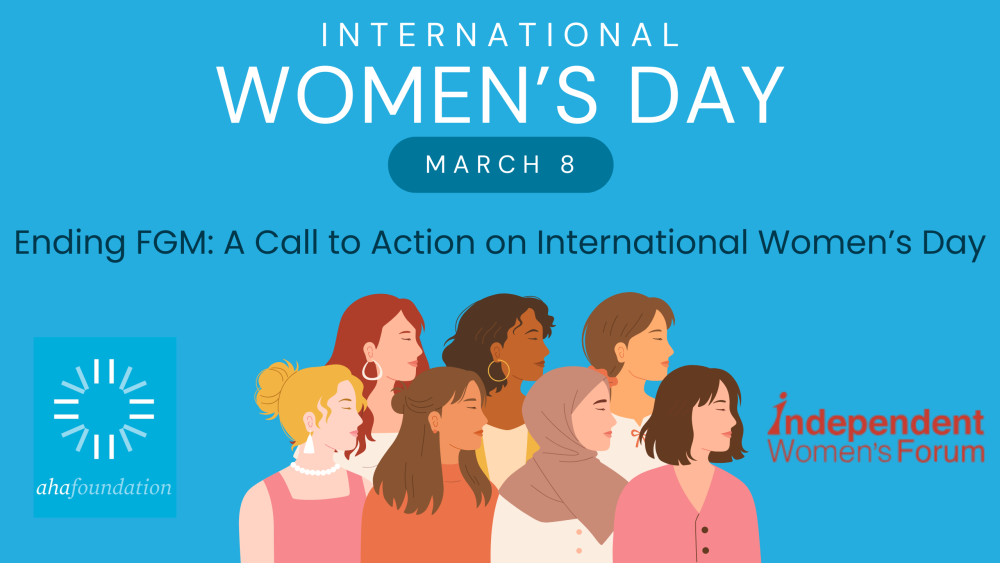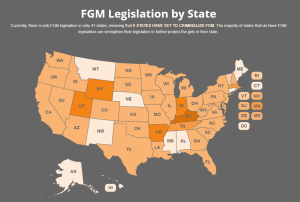Ending FGM: A Call to Action on International Women’s Day

As we observe International Women’s Day, the fight to end Female Genital Mutilation (FGM) remains critical. While progress has been made, nine U.S. states still lack laws banning this grave human rights violation. To shed light on the path forward, Michele Hanash, AHA Foundation’s Director of Policy and Women’s Programs, teamed up with Andi Bottner, Vice President of External Relations at the Independent Women’s Forum, to discuss key strategies for strengthening FGM legislation in the U.S.
FGM (Female Genital Mutilation) is a critical issue to address on International Women’s Day as it represents a severe violation of women’s and girls’ rights, affecting millions globally. It highlights the ongoing struggle for gender equality, bodily autonomy and physical safety. By raising awareness about FGM, we take a stand against this abuse and work towards a world where every woman and girl can live free from violence.
The World Health Organization defines FGM as the partial or total removal of the female external genitalia or other injury to the female genital organs for non-medical reasons. FGM is a form of gender-based violence that is internationally recognized as a violation of women’s and girls’ fundamental human rights. The practice of FGM is generally motivated by beliefs about what is considered proper sexual behavior and cultural ideas of femininity and modesty. This includes the notion that girls are “clean” and “beautiful” after the removal of body parts that are considered “male” or “unclean.” FGM is also considered a way to reduce a female’s libido, safeguarding virginity and marital fidelity. Communities that practice FGM often believe that it will ensure a girl’s marriageability, virginity, beauty, and/or family honor, and families can face immense societal pressure to conform to social standards and subject girls to FGM.
FGM is most commonly inflicted upon a girl between infancy and 15 years of age. FGM has four main types, which can be as severe as removing the labia and sewing the vaginal opening shut, leaving an opening as small as a matchstick for urine and menstrual fluids to pass through. The procedure is typically carried out by traditional practitioners, without anesthesia or antiseptics, using a knife, razor blade, or other objects such as scissors or broken glass. FGM has no health benefits. Many girls who undergo FGM face lifelong physical and psychological consequences. The practice of FGM can indirectly or directly lead to death.
AHA’s groundbreaking 2023 study on the incidence of FGM in the U.S. found that 30,956 girls in the U.S. are likely at risk of FGM and 384,714 women and girls in the U.S. are likely living with FGM. Thankfully, 41 states in the U.S. have passed anti-FGM legislation, and a law pending in the District of Columbia should soon become law. Combating FGM is a non-partisan issue and support cuts across party lines. The nine states remaining without laws specifically banning FGM are both red and blue states: Alabama, Alaska, Connecticut, Hawaii, Maine, Mississippi, Montana, Nebraska, and New Mexico. FGM is further against the law on the federal level. The first U.S. federal law to combat FGM was signed by President Bill Clinton in 1996. However, in 2021, new legislation was enacted. The STOP FGM Act of 2020, signed by President Trump, strengthened U.S. protections against the abuse.
Why 9 states still lack specific FGM bans
Michele: There are various reasons, ranging from hesitation to implement new criminal laws to misunderstandings about the issue and fear of alienating or offending communities perceived to practice FGM. In some states, there is also a misconception that they are unaffected by FGM, but data shows there are survivors and girls at risk in every state. Regardless, even if only one girl were at risk, she deserves protection. Unfortunately, issues affecting girls are often deprioritized.
Andi: Michele, I absolutely agree that in those states without legislation there is a lack of understanding as to what the practice is and does to young women, along with a hesitancy to offend. I think we often see this lack of leadership when there is ignorance and misperception. That is why the work of the AHA Foundation is critically important so that public awareness continues to grow.
Hopes for the Current Legislative Session
Michele: I hope to see bills passed where they are currently pending, like in DC, where we have worked for over 6 years on legislation to end FGM. I would also like to see legislation advance in Nebraska, Alabama, and Mississippi, where we have had recent conversations with legislators. Nebraska has the highest estimated impacted population. Since the current administration is an administration that signed legislation to ban FGM and has prioritized the issue, I hope this will energize states that have been pushing off the problem. Five of the nine states that have thus far failed to act are Republican-led (AL, MT, NE, MS, AK), and four are Republican trifectas (AL, MT, NE, MS).
Andi: Where there are bills pending, we must work toward passage! The fact that many of these states without legislation are Republican led, I hope they recognize that our current President is the leader who signed the federal anti-FGM law before he finished his first term in office. If that isn’t a strong signal to members of the party, I don’t know what is. Again, emphasis on raising public awareness as to this practice in those states is key.
Concerns Going Forward
Michele: Enthusiasm for combating FGM is great. However, while engaging in these efforts, it’s very important not to conflate FGM with other issues. We cannot address FGM if we are confusing it with other issues. We saw several unsuccessful attempts in a couple of states in past years to modify FGM laws to address other issues. Thankfully, these bills did not pass, and legislators were receptive to information explaining why amending FGM bills to address other issues was a bad idea. Had these bills passed, they would have done real damage to the movement and, ultimately, the girls these laws are intended to protect. Otherwise, the fear is that legislators will ignore this important women’s and girls’ rights issue.
Andi: Female genital mutilation is violence against women and must not occur. It should be addressed directly and plainly by lawmakers. There is no need to conflate it with other issues; it stands alone as a practice that must be ended. Legislators should keep their attention on ending this in their communities and protecting the young women and girls at risk of this procedure. That sort of singular focus is what will help pass laws.
On International Women’s Day, as the world puts its attention to the various achievements made by women globally, let’s not forget to address the gender-based violence that holds women back. Let our call to action be increased efforts to end this abuse against women and girls.


